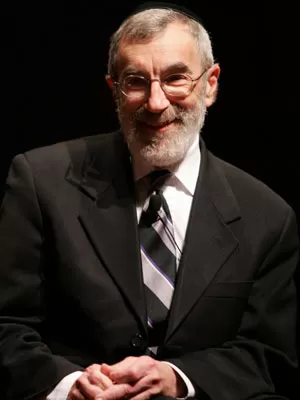Nov 1, 2004 - 12:00 pm
Paul Schoenfield: Camp Songs (2001)
Commissioned by Music of Remembrance
| World premiere: | |
|---|---|
| April 7, 2002, Benaroya Hall, Seattle, WA, at Music of Remembrance’s Holocaust Remembrance concert. It is dedicated to Music of Remembrance’s founder and artistic director, Mina Miller. | |
| Texts: | |
| in Polish by Aleksander Kulisiewicz (1918-1982), from his internment in the Sachsenhausen concentration camp. World premiere of new English version by Katarzyna Jerzak: November 8, 2004 |
|
“In the camp, I tried to create verses that would serve as direct poetical reportage. I used my memory as a living archive. Friends came to me and dictated their songs.” – Aleksander Kulisiewicz
Who was Aleksander Kulisiewicz? A non-Jewish journalist, Aleksander Kulisiewicz was born in Krakow in 1918. Soon after the German takeover of Poland he was denounced for his antifascist writing and sent to the Sachsenhausen concentration camp near Berlin. Kulisiewicz wrote 54 songs during his nearly six years at the camp. He was liberated in May 1945, and devoted most of the rest of his life to collecting and documenting the songs and other music created in concentration camps.
Kulisiewicz wrote many of his own songs and poems in response to personal and communal experiences within Sachsenhausen, and others in reaction to news from the outside world that had filtered into the camp. He organized and performed at secret gatherings of illegal poetry readings and sings. Denounced to the authorities as a “nightingale,” Nazi doctors tried to silence him through barbaric pseudo-medicine – for example, injections of diptheria bacilli to destroy his voice. When these attempts were unsuccessful, the Nazi’s “let the dog sing.” Kulisiewicz’s songs were an act of spiritual resistance, a documentation of the war’s atrocities, and a means to his own survival.
Kulisiewicz survived the Holocaust. After liberation, he dictated hundreds of pages of his own and his fellow inmates’ songs to his attending nurse at a Polish infirmary. In the 1950s, he began amassing a private collection of music, poetry and artwork created by camp prisoners. Kulisiewicz gathered much of his materials through correspondence and hundreds of hours of recorded interviews. After Kulisiewicz’s death in 1982, his collection was acquired by the United States Holocaust Memorial Museum in Washington, DC.
Music of Remembrance’s artistic director Mina Miller was introduced to the Kulisiewicz Collection in the Museum’s archives by the USHMM’s musicologist Bret Werb. Miller knew immediately that she wanted composer Paul Schoenfield to do something with this extraordinary legacy. Schoenfield accepted MOR’s commission, and in July 2000 Miller and Schoenfield met in Washington with Werb to delve deeply into the collection.
Camp Songs is Schoenfield’s setting of five texts written by Kulisiewicz himself during his internment in Sachsenhausen. Especially in the first song (Black Boehm) and the last one (Adolf’s Farewell to the World), Schoenfield also made use of Kulisiewicz’s thematic material. The songs are remarkable for their mordant irony, and their juxtapositions of the heartbreaking with the absurd. For example, Black Boehm mocks a short hunchbacked capo named Boehm, whose enthusiasm for his job at Sachenshausen’s crematorium gave him a distinctly charred appearance. (In 1941–42 alone, Boehm helped cremate 18,000 Soviet prisoners of war at Sachsenhausen.)
For Camp Songs’ premiere by Music of Remembrance in 2002, Schoenfield used the original Polish of the Kulisiewicz texts. MOR’s November 2004 performance marked the world premiere of a new English translation by Katarzyna Jerzak. Jerzak related some of the challenges she faced in preparing the translation: “Having sung the English to the music in an effort to match the syllables and the accents to the melody, I found myself haunted by the songs which played over and over again in my mind long after I had finished the translation. As a Pole and a Jew, whose family survived the Holocaust through a series of minor miracles, I could not help but identify deeply with the implicit or explicit speakers.”
Schoenfield’s Camp Songs challenges the expectations of even the most hardened student of Holocaust art. The texts describing raw survival, with their grim humor and sardonic wit, lay bare the fury seething beneath the terrors of the camps. The composer remarked: “The poems that I am setting are caricatures which (in Joseph Conrad’s words) ‘put the face of a joke upon the body of truth.’ They are an affirmation of dignity; a declaration of man’s superiority to all that befalls him.”
In summer 2003 Miller received a personal letter from Krzysztof Kulisiewicz in Poland, Aleksander’s son. Kryzsztof learned of Camp Songs when he came across Music of Remembrance’s CD recording in the course of an internet search. He wrote: “I was deeply moved to hear my father’s texts and this beautiful music written thousands of miles away, in the USA, by someone who has never seen my father. And then I understood that my father’s mission was great and that he was right.”
Camp Songs was a finalist for the 2003 Pulitzer Prize in Music.


